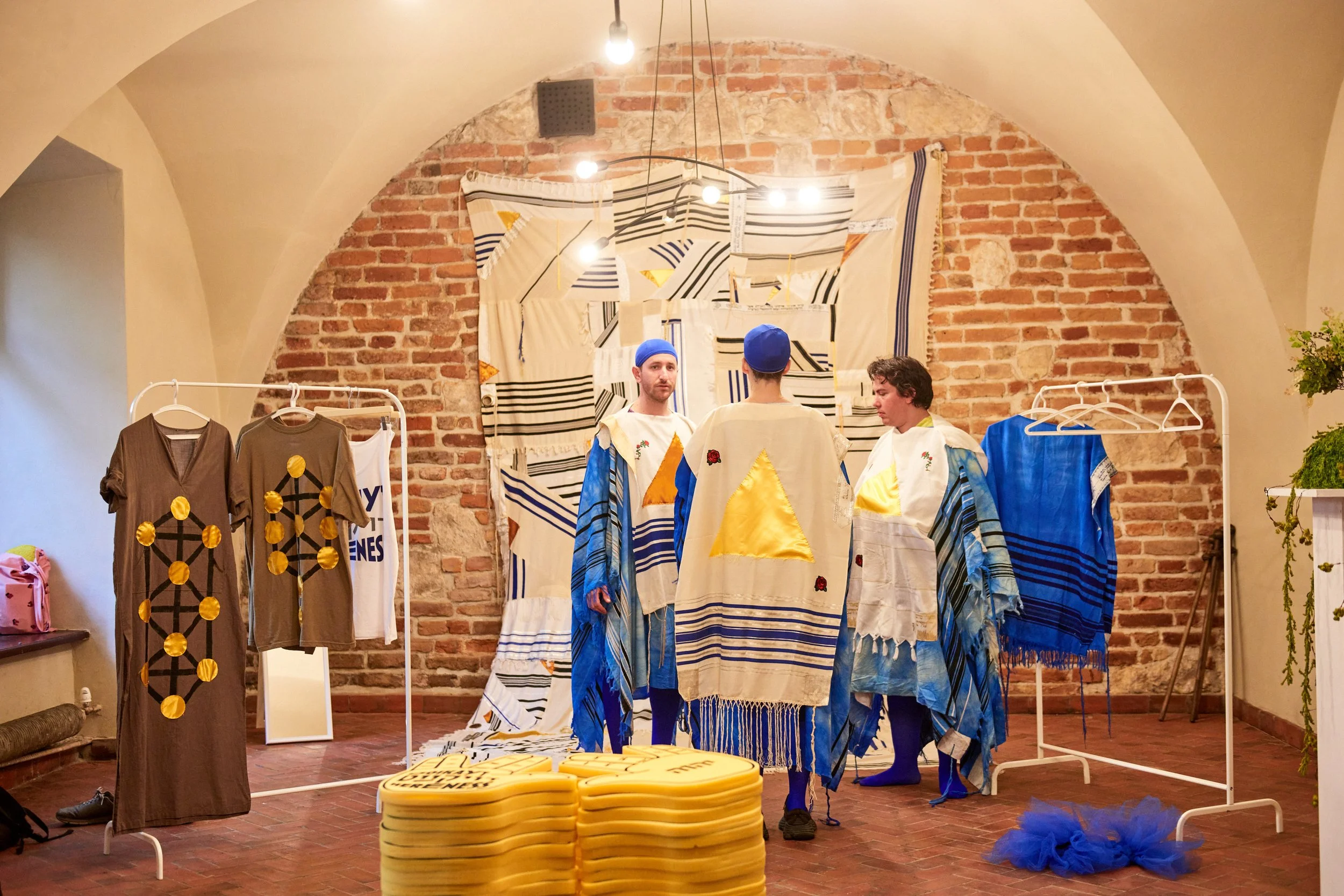Seven beggars
a live performance and video installation that boldly reimagines an 18th century Hasidic tale in Poland
2023–2024
The Twisted Throats, Seven Beggars, documentation of a performance in Krakow, Poland on June 28, 2023 (photo credit Konrad Obidzinski)
For centuries, mythological figures like tzadiks, dybbuks, and golems populated the Yiddish folktales of Eastern Europe, animating the dreams and waking life of daily Jewish existence before the Holocaust. The tzadik is a holy figure often disguised as a beggar, the dybbuk is a wandering spirit that possesses a living body, and the golem is a clay creature brought to life to protect those in danger. Poignant and powerful, these characters represent the dynamism of the Yiddish spiritual imagination. By embodying these Yiddish myths in Eastern Europe, their symbolic place of origin, Weitz transforms the cultural memories of genocide and displacement into reparative tools for healing in the present.
From June 27-July 2, 2023, Weitz and her collaborators staged six live street performances in Krakow, Poland and one theatrical production at the Galicia Jewish Museum during the 32nd Jewish Culture Festival. For each performance, Weitz embodied a different beggar from Rebbe Nachman’s famous story, The Seven Beggars. She was accompanied by a cast of other Ashkenazi diasporic artists, including poet Moriel Rothman-Zecher, musician Ira Khonen Temple, and art director Anna Lublina. Their vibrant reimagining of Nachman’s cryptic tale invited audience participation and combined poetry, music, movement, and visual art to reveal how each beggar’s impairment is actually a blessing in disguise. Using video footage of the live performances, Weitz is currently developing the artwork into a multichannel video installation.
The Hunchback, Seven Beggars, documentation of a performance in Krakow, Poland on June 29, 2023 (photo credit Konrad Obidzinski)
The Withered Hands, Seven Beggars, documentation of a performance in Krakow, Poland on June 28, 2023 (photo credit Konrad Obidzinski)
The Withered Hands, Seven Beggars, documentation of a performance in Krakow, Poland on June 28, 2023 (photo credit Konrad Obidzinski)
WEITZ ENGAGES WITH YIDDISH STORYTELLING AND ASHKENAZI PERFORMANCE TRADITIONS AS A MODEL FOR ALL PEOPLE TO RECLAIM CULTURE AND LANGUAGE IN THE WAKE OF ETHNIC VIOLENCE AND DISPLACEMENT.
The Hunchback, Seven Beggars, documentation of a performance in Krakow, Poland on June 29, 2023 (photo credit Konrad Obidzinski)
The Stammerer, Seven Beggars, documentation of a performance in Krakow, Poland on June 29, 2023 (photo credit Konrad Obidzinski)
The Stammerer, Seven Beggars, documentation of a performance in Krakow, Poland on June 29, 2023 (photo credit Konrad Obidzinski)
The Blind Beggar, Seven Beggars, documentation of a performance in Krakow, Poland on June 27, 2023 (film still)
The Blind Beggar, Seven Beggars, documentation of a performance in Krakow, Poland on June 27, 2023 (film still)
The Twisted Throats, Seven Beggars, documentation of a performance in Krakow, Poland on June 28, 2023 (photo credit Konrad Obidzinski)
The Legless, Seven Beggars, documentation of a performance at the Galicia Jewish Museum, Krakow, Poland on July 2, 2023, duration 55 minutes (photo credit Ada Kopec-Pawlikowska)
The Hunchback, Seven Beggars, documentation of a performance in Krakow, Poland on June 29, 2023 (photo credit Konrad Obidzinski)
Seven Beggars, Installation view, Galicia Jewish Museum’s High Synagogue in Krakow, Poland, 2023 (photo credit Konrad Obidzinski)
Seven Beggars, video installation mockup, 2023
Seven Beggars was supported in part by Mid Atlantic Arts through USArtists International, a program in partnership with the National Endowment for the Arts; the Andrew W. Mellon Foundation; and the Trust for Mutual Understanding. Seven Beggars is also supported by Asylum Arts at The Neighborhood: An Urban Center for Jewish Life. Julie Weitz's My Golem is a project of Fulcrum Arts’ Emerge Program.













